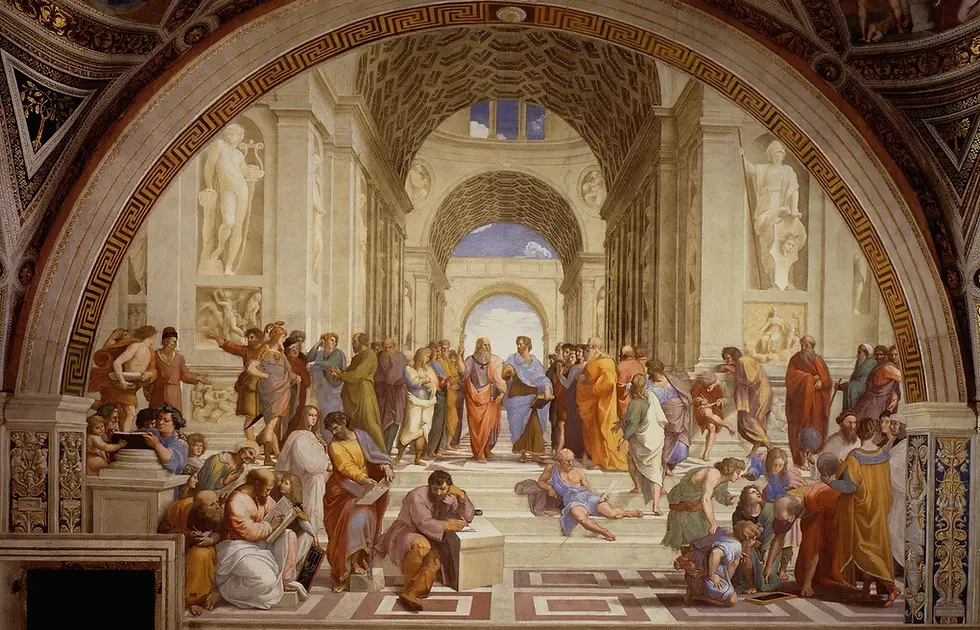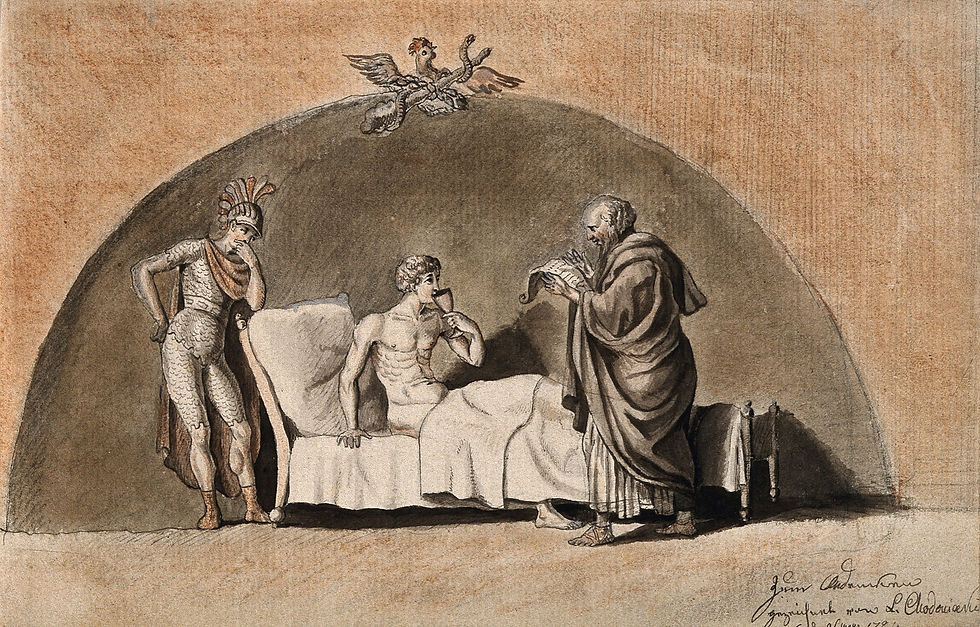In Conversation with Kate Cooper
- Ruby Day

- Aug 2, 2025
- 8 min read
Updated: Aug 6, 2025

In our last issue of the year, we decided to give complete creative freedom over submissions; as a result, I decided to reach out to Professor Kate Cooper to hear her thoughts on the formative powers of history, centralising the individual in our studies, and the historical fiction book club initiative that she runs. It was lovely to talk to Kate, and I hope her words inspire you as much as they did me!
Ruby: As a history student, my passion for history has become a defining characteristic. How would you say the historical discipline has shaped you?
A: I think I'm quite an unusual case, in that I really got into history with a specific question. When I was at university I was doing film studies, and I was interested in becoming a filmmaker, but my curiosity was really provoked by the role of women.
It was the 1970s when I started university, and there was a historical question on the ground: 'What are we going to do with gender inequality?' And is that going to change, can it be changed? My parent's generation really saw gender inequality as just a pure fact of nature. But there were rumblings detectable even to a first-year undergraduate, people were starting - and you can't believe this, but that's literally in my lifetime as a historian - that women's history went from being five books, one on medieval women, one on ancient women, and that's it, to there being a landscape of conversation. And that has literally happened since I started as an undergraduate! It's astonishing how quickly that has changed. I saw that there was this conversation developing and I really wanted to get into it.
I got into early Christianity because at the time there was this real question about if religion was bad for women. And I really wanted to understand that, partly because you could see in 1978, when I started university, we were at the height of the secularisation process in the English-speaking world. Even though in America, where I grew up, that has all gone a lot more slowly than it has in the UK, you could even feel that there was a culture was developing about if religion was intrinsically misogynistic. So I thought oh, I'll study ancient Christianity to figure that out!
In a way I have to say it was a really good choice because it was a field that was opening up and I had a chance to do influential work. As a young person with a lot of energy in a field that was just emerging, that was a good match. But it also, in some ways was disappointing, and in some ways it was fascinating, to discover that in answer to the question of if religion is intrinsically misogynistic, no. It's not.
What I would now say, is that ideals and ideological frameworks can be used by people to affect whatever it is they are trying to affect. If you look historically, religion gets used 'against women' and it gets used 'for women'. It's a tool whose properties are not intrinsically favourable to one side or the other. On the other hand, it's still interesting to see how it gets used, and the patterns that emerge about negative womanly influence in the Western Christian tradition, the whole narrative of Eve. Or when they are talking about women as carriers of a privileged moral authority, and a different set of female saints, Mary, etc.
It's super interesting to look at how these rhetorics work. Something I don't really know is if I, or anybody else, can figure out a way to explain this that protects us from these things when used in an unfair or manipulative way. That, I admit, I still haven't figured out! From my perspective, I feel like I have now got to the point where I understand the roles of this way of manipulating imagery around women - so it protects me in my personal life, but not everybody can do a PhD and spend 40 years as a jobbing historian!
It's interesting to me that it is really hard to take complex cultural analysis and make it available. That is one of the sad discoveries of my career as a historian, it's comparatively a lot easier to come up with a narrative that is emotionally motivating and anger driven. If I wanted to convince the world that Christianity is bad, I could develop a following around that. It's a simple concept, it may be wrong, but it's something that people can capture, and it motivates their anger. Admitting instead that the world is a lot more complicated, sadly doesn't get as much traction! Which is interesting and weird!
Ruby: Your profile on the Royal Holloway website says you value storytelling and memory as key principles. Would you say these concepts (human nature, if you will) are a constant within history, no matter the period?
A: It's tricky. If your question is about human constants, I do think that we have to accept that we don't know literally what any other human being's experience is. In that sense, all the more so when it's somebody from a completely different culture.
I have friends who do ritual studies who say that 'when the body makes this movement, it triggers these hormones, and it makes you experience this'. And I say that's a fantastic observation to throw into the mix. But we don't know for sure whether human beings, especially in a certain society, make a set of movements repeatedly and they associate it with something culturally specific. That's going to change how they experience it. There's always that quality of approximation any time we try to make a connection to the experience of another human being. Once you get cultural difference, and difference of historical period, it escalates. You have to take that seriously.
Having said that I have recently become really interested in the possibility that our historical thinking is too narrow and that moving into areas where the evidence isn't firm, imaginatively, is very important. A great case for me is historical novelists. They're writing in a situation where there's a lot they don't know about the historical period. They have this strong hypothesis of comparability - that these are people we can understand in the way that we would be motivated in that situation.
In my experience, for every error a historical novelist makes because they don't understand how different the 4th century, or the 5th century was, then they will often bring at least as much insight because of their interest in it. They have a different way of thinking about causality and consequence and motivation than historians do. We have this idea that the more evidence you can come up with, the more you can hypothesise the engine of an action leading to consequences. Whereas novelists have this idea that once you have a character and context, it's like running a computer modulation. This kind of character, if you put that person under a certain kind of pressure, it will lead to a certain consequence. And novelistic truth is all about 'does this character act in a way that feels real to us psychologically under those circumstances?'.
It's a completely different model of agency and consequence. What I find interesting is listening to how historical novelists find meaning in historical situations. Often, it's not just that they think differently than us, but it's that they're willing to go into areas where I wouldn't enter because I don't have the evidence for it! Therefore, I don't even ask the question.
I have a case in a 6th century religious text where this person warns a woman that the devil could take soul on the basis of a dropped stitch in needlework. For years, I've thought 'what does that mean? How could you figure that out?'. Something I've really noticed from looking at historical novels is how they often talk about women doing domestic work together; the kind of arguments that can develop in that environment of women being very constrained and restless and doing meticulous work together over time, having the kind of argument that wouldn't happen if they have the chance to leave the house. All of a sudden, I started to realise that the devil can't take your soul because of a dropped stitch, but if you're in a situation where you drop a stitch, and you're just getting angry and agitated... It opens up a way of thinking about the environment in which somebody might have been doing their needlework in the 6th century.
We can't prove it, but by even having that question, we know more than if we disregarded it as something we could never know.
Ruby: Off the back of that, you run a historical fiction book club! How important is reframing the discourse around historical subjects to you, in the form of a book club rather than a lecture?
A: First of all, we have a very firm policy that you don't have to read the book to come along. If people want to come along and hear a bit about the book, we always have two people physically there who have read the book, and you can listen to them. We have designated readers, so we are absolutely positive we have someone who can talk about it!
But one of the things that's really fun about it is getting people asking questions: saying, 'this novel set in the crusades, does it really deal with what I heard in my She-Wolves class, etc.?'. I think that's fun! You can get into a conversation that really sheds light on the book, and sometimes sheds light on the period, or on differences between history and fiction.
Next year we're going to be online; this year we found that enough people couldn't come to campus that day, it felt like even though it's fun to be physically in person, there was a real downside! We'll try and do an end of year party or something, depending on how it goes. In a way it's unfortunate, because one of the things I really like about the group is that people from different layers of the department community come along. I'm always looking for opportunities to have conversations with students and staff that are more conversations and less instrumentalised towards some academic output.
My philosophy of learning is that you often learn less when you're trying to complete an output than when you're in explore mode. In that sense, I'm a big fan of exploration and playful engagement. I do think it's hard for students to get used to being in explore mode in front of older people! Which is a sad reality, so part of the initiative is trying to break that down. It's easier for that to happen in an in-person situation, but on the other hand, I do think for people who are a little bit shy, they wait to see when they feel more comfortable online. There's more of an opportunity to see people eventually get comfortable and start to talk that way. Different ways of doing things work for different people.
Interviewed by Ruby Day (24-25 Assistant Editor), 2nd Year History
Layout by Charlotte Reid (24-25 Editor-in-Chief), 2nd Year History
Issue 19, Historia's 5th Anniversary, June 2025
Kate Cooper is a social and cultural historian of Late Antiquity. Her research explores how women, children, and adolescents changed history in various ways.
If you are interested in her historical fiction book club, do not hesitate to contact her via her email :)



Comments